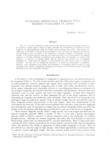The use of selective fungicides started around 1960 and has become increasingly popular for the purpose of plant disease control in Japan, although the development of resistance to these fungicides by phytopathogenic fungi has caused serious problems since 1970. Characteristics of fungi such as mutability of the gene(s) controlling the site of action of the fungicides and the rate of multiplication may be related to the emergence of mutants resistant to fungicides, and the
viability of the resistant mutants may also be an important factor for the development of fungicide resistance in the field. Methods of application and residual effect of fungicides are linked to the efficiency of selection of resistant strains, and the intensive and exclusive use of fungicides belonging to a single group in relation to cross-resistance has often been a cause of fungicide resistance. The best way of solving this problem is to avoid the development of resistance. Recently, some experiments have shown the possibility of controlling resistant strains by using chemicals which exhibit a negatively correlated cross-resistance to the resistant strains or block the biochemical reactions causing the resistance.

